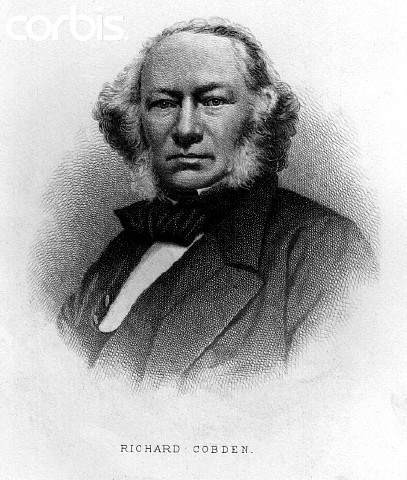Liberty Matters
Richard Cobden: Further Thoughts and Future Prospects
 Stephen Davies’s excellent summary of the conversation offers much food for thought. The conversation has ranged far and wide in exploring, explaining, and defining Cobden’s influence in time and space. The multifaceted influence and relevance of Cobden’s ideas has been very apparent. The centrality of the League campaign is entirely understandable and justifiable but should not of course blind us to Cobden’s long-term international influence, and the longevity and continuing relevance of his ideas. The domestic influence of Cobdenite ideas was indeed great, and the growth of consumer-related politics as the primary theme of free-trade agitation in a more democratic age, with a mass of working-class consumers and voters, was long-lived, despite coming to a rather abrupt end.
Stephen Davies’s excellent summary of the conversation offers much food for thought. The conversation has ranged far and wide in exploring, explaining, and defining Cobden’s influence in time and space. The multifaceted influence and relevance of Cobden’s ideas has been very apparent. The centrality of the League campaign is entirely understandable and justifiable but should not of course blind us to Cobden’s long-term international influence, and the longevity and continuing relevance of his ideas. The domestic influence of Cobdenite ideas was indeed great, and the growth of consumer-related politics as the primary theme of free-trade agitation in a more democratic age, with a mass of working-class consumers and voters, was long-lived, despite coming to a rather abrupt end.While clearly an important figure in forging new and more effective modes of political agitation, perhaps Cobden’s most lasting achievement was in creating an intellectual outlook that linked domestic commercial policy, antimilitarism, and international commercial cooperation, which ultimately offered a vision of a better future for humanity. For Cobden international free trade should lead to a transformation in the conduct of diplomacy and foreign policy, from being the province of diplomats and politicians to that of communities, merchants, and traders. Cobden’s internationalist outlook, as described by Stephen Davies, was of a world where there would be an international community sharing common principles and values, and which possessed a broad agreement on arbitration, conciliation, and the peaceful settling of international disputes.
The practicality of these ideas was questioned even by Cobden’s admirers. For example Goldwin Smith claimed that Cobden had succumbed to his own enthusiasm:
Hardly any mind can escape the bias of its history. Cobden’s had no doubt constructed a bias, and a serious one, from the Free Trade struggle. Absolutely free from any sordid sentiment, from any disposition to believe that man lives by bread alone, from any conscious preference of material over moral and political consideration, yet he was inclined to overrate the beneficent power of commercial influences, and consequently the value of commercial objects.[101]
Nevertheless, elements of Cobdenite thought remain in the international policy space, and free trade has generally retained its positive connotations despite attacks from the modern “fair-trade” movement. Of course, while many politicians pay lip-service to the moralistic and ethical aspects of free trade, in practice, the implementation of the policy, or the extent of its application, is largely dictated by national “vital interests.” Clearly, this “politicking” would not be approved by Cobden, for as he famously stated on 28 June 1850:
I believe the progress of freedom depends more upon the maintenance of peace, the spread of commerce, and the diffusion of education than upon the labours of Cabinets or Foreign-offices.[102]
While we are very far from having established this state of affairs in foreign relations, it remains a noble aspiration. Yet somewhat ironically, the desire to sustain local economies and small producers, underpinned by ethical and moral imperatives, in a “fair” global commercial environment has resulted in broad-based attacks by NGOs and anticapitalist protesters against open markets and globalization.[103] Popular protest has been supplemented by the loss of academic and theoretical hegemony, with the complexity of the international economy making the modern case for free trade appear, according to Razeen Sally, as “too narrow and mechanical” and even “a little unreal.”[104]
It is certainly true that a particularly interesting aspect of the conversation has been the contemporary as well as historical relevance of many of Cobden’s ideas. Perhaps new social media will more easily allow the transmission of Cobdenite ideas as well as other radical ideas to reach a wider audience with far less effort than Cobden had to exert. While it seems unlikely that the mere existence of social media can lead to a greater interest in politics or political ideas, it can certainly supplement a popular movement and create something of a community of interest. In that respect, I am not so far away from the more optimistic position of Sarah Richardson and Stephen Davies.
Endnotes
[101.] Smith, Goldwin. 1911. Reminiscences. Arnold Haultain (ed.) New York: Macmillan and Co., p. 246.
[102.] Cobden, "Speech in the House of Commons (June 28, 1850)," Speeches on Questions of Public Policy, vol. 2, 228 </titles/931#Cobden_0129.02_315>. For speeches on this theme see: Speeches on Questions of Public Policy by Richard Cobden, M.P., ed. by John Bright and J.E. Thorold Rogers with a Preface and Appreciation by J.E. Thorold Rogers and an Appreciation by Goldwin Smith (London: T.Fisher Unwin, 1908). 2 volumes in 1. Vol. 2 War, Peace, and Reform.
[103.] Irwin, Douglas A. 2002. Free Trade under Fire. Princeton: Princeton University Press, p. 225-28.
[104.] Sally, Razeen. 2008. Trade Policy, New Century: the WTO, FTAs, and Asia Rising. London: Institute of Economic Affairs, p. 47-8.
Copyright and Fair Use Statement
“Liberty Matters” is the copyright of Liberty Fund, Inc. This material is put on line to further the educational goals of Liberty Fund, Inc. These essays and responses may be quoted and otherwise used under “fair use” provisions for educational and academic purposes. To reprint these essays in course booklets requires the prior permission of Liberty Fund, Inc. Please contact oll@libertyfund.org if you have any questions.